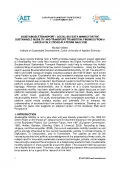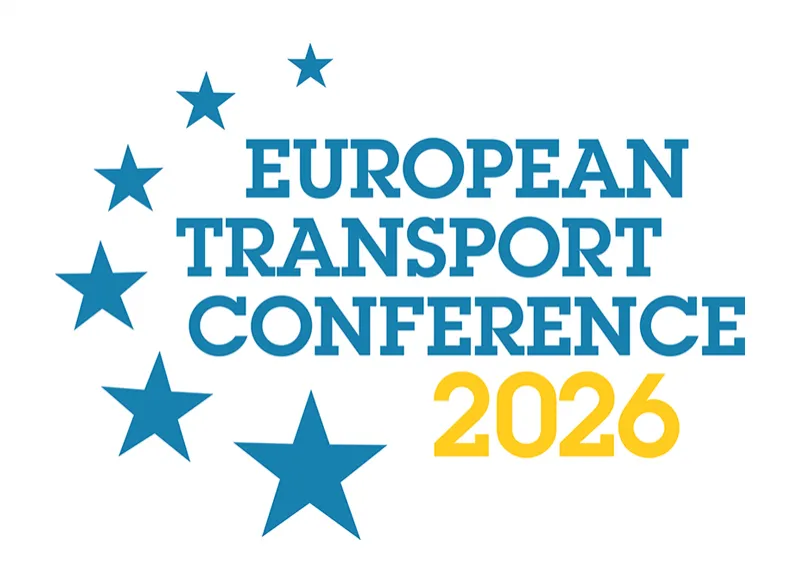-
Past ETC Papers

Browse, search and view papers from the past AET Conferences.
-
Members' Area

AET promotes networking and exchange of ideas, information and opportunities amongst members.
Conference Papers 2022
Milan, Italy
ETC Conference Papers 2022
#SUSTAINABLETRANSPORT - Social Big Data Mining for the Sustainable Mobility and Transport Transition: Findings from a Large-Scale Cross-Platform Analysis
Seminar
Day 3 (9 Sep 2022), Session 8, DATA EVALUATION, 09:30 - 11:00
Status
Accepted, documents submitted
Submitted by / Abstract owner
Michael Stiebe
Authors
Michael Stiebe
Short abstract
Understanding the evolution of the sustainable mobility discourse can mean critical advantages for decision-makers and strategists. This paper reports findings from a 2021 large-scale cross-platform social big data analysis on Twitter and Instagram.
Abstract
Due to the platformization of the internet that has already given rise to a plethora of global social media platforms, such as Facebook, Instagram, Twitter, and many more, there is a constantly growing ocean of user-generated data concerning a very broad array of social, political, economic, and other issues, for instance, sustainable mobility or sustainable transport. This growing pool of data from such platforms is often labeled social big data. Many social media data mining studies draw on only one social media platform. There are growing concerns in the academic community regarding these mono-social media platform studies since no single social media platform is representative of the general population leading to major implications for studies that rely on social media data (Blank & Lutz, 2017). Thus, it is of utmost importance to enhance the existing methodology, and transition towards cross-platform social media analysis approaches (Rogers, 2017). The hashtag functionality, used on various social media platforms, is a great means of conducting a comparative analysis of the digital discourse on cultural and sociotechnical phenomena across platforms. Since hashtags are widely used on Twitter and Instagram, these two platforms were chosen for the research project. Drawing on this relatively novel method as an extended practical example of empirical research, this project aimed at exploring how this could enhance Sociotechnical Sustainable Transport Research, the general understanding of sociotechnical low-carbon transport transitions, and catalyze well-informed decision-making in sustainable transport policy and infrastructure planning.
The study has drawn on an exploratory FAIR cross-platform social media analysis approach based on Instagram and Twitter posts. Two umbrella themes commonly associated with low-carbon transport transitions, namely 1) sustainable transport, and 2) sustainable mobility, were translated into the cross-platform compatible hashtag mining queries #sustainabletransport and #sustainablemobility. In total, 33,121 Tweets (16,608 for #sustainabletransport and 16,513 for #sustainablemobility) as well as 8,089 Instagram image posts together with their captions, i.e., 4,054 for #sustainabletransport and 4,035 for #sustainablemobility, spanning time frames from 2013 to 2021 and 2017/2018 to 2021, respectively, were mined via self-written Python scripts predominantly building on the libraries Twint and Instaloader. Quantitative text and sentiment analyses were applied to the Tweets and image captions. Additionally, an automated (object recognition) image analysis using the Instagram picture file dataset was conducted. Synthesized results formed the base for the cross-platform analysis comprising: 1) hot topics, 2) mentioned users, 3) sentiment, 4) co-hashtags.
Some of the core findings of this study combining the results of the hot topic as well as co-hashtag analyses comprise insights into the main themes and thematic clusters within the sphere of the digital discourse on Twitter and Instagram regarding the concepts of sustainable transport as well as sustainable mobility. It has become apparent that only the third of Holden et al.’s (2020) Grand Narratives for sustainable mobility, i.e., Electromobility, has been significantly present in the digital discourse on both platforms, especially on Instagram. While the strongest link to #sustainablemobility was the electromobility theme, #sustainabletransport was related the closest to the theme of Active Transport, especially bicycling. Despite not being included in the Grand Narratives, the latter theme, namely Active Transport, has been the most prominent one across the two platforms based on aggregated results from the co-hashtag as well as hot topic analyses. One of the most striking results regarding the cross-platform analysis of the most frequently mentioned users was that the Elon Musk/Tesla cluster was the most dominant one concerning both platforms. Interestingly, related mentions have only been associated with #sustainabletransport, both on Twitter and Instagram. Whereas public transport and low-mobility societies are among the main topics of contemporary sustainable transport and sustainable mobility research (Holden et al., 2020; Zhao et al., 2020), both themes were neither significantly reflected in the digital discourse regarding #sustainabletransport nor #sustainablemobility. Interestingly, alternative fuels/synthetic fuels or hydrogen mobility have not been reflected to any considerable extent either.
The cross-platform analysis revealed significant semantic differences between the concepts of sustainable transport and sustainable mobility on both platforms, Twitter as well as Instagram. In academia, however, sustainable transport and sustainable mobility are frequently used as arbitrary and interchangeable concepts. This practice should be questioned since the results from this study suggest that sustainable transport and sustainable mobility are concepts with different connotations, public perceptions, and nuances that should especially not be overlooked by engaged scholars in the field. Lastly, acknowledging the importance of the social media discourse on sustainability issues, the author draws on key results of this study and provides an adapted version of the Geelsean Multi-Level Perspective on Transitions.
Programme committee
Data
Documents:


Association For
European Transport
Forester House
Doctors Lane
Henley-in-Arden
Warwickshire, UK
B95 5AW
+44 (0) 15 64 793552
VAT number: 710 1866 64
Conference Supporters & Endorsers




Legal Entity
The Association for European Transport is registered as an Association ('vereniging') with the Chamber of Commerce for Haaglanden in The Netherlands under company number 27170096.
Built on Zenario




